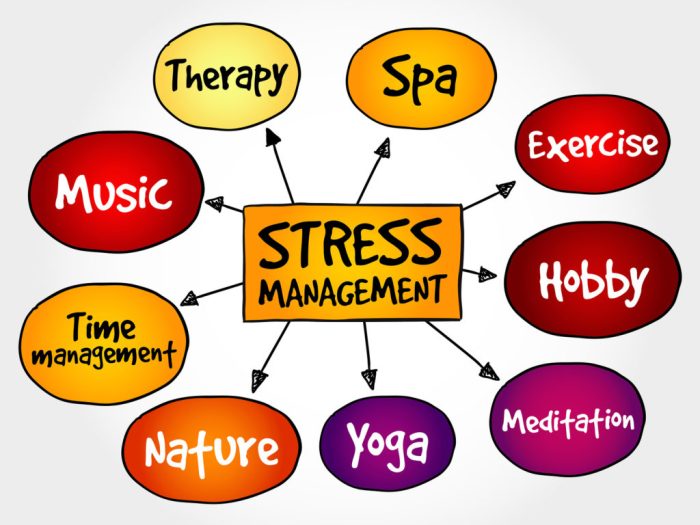Stress management is all about keeping your cool in the midst of chaos. From tackling daily stressors to finding inner peace, this guide dives into effective strategies for a healthier, happier you.
Understanding Stress Management
Stress management is the practice of utilizing techniques and strategies to cope with and reduce the negative effects of stress on the mind and body. It involves recognizing stress triggers, developing healthy coping mechanisms, and establishing a balance between work, personal life, and relaxation.
Importance of Stress Management
Stress management is crucial for overall well-being as it helps prevent chronic stress, which can lead to various health issues such as anxiety, depression, high blood pressure, and weakened immune system. By effectively managing stress, individuals can improve their mental health, boost productivity, enhance focus, and maintain a positive outlook on life.
Positive Impacts of Stress Management Techniques on Mental Health
- Regular exercise releases endorphins, the body’s natural stress relievers, promoting a sense of well-being and reducing anxiety.
- Practicing mindfulness and meditation can help calm the mind, improve concentration, and reduce negative thought patterns.
- Engaging in hobbies and activities that bring joy and relaxation can provide a distraction from stressors and enhance overall mood.
- Establishing a support system of friends, family, or a therapist can offer emotional support and perspective during challenging times.
Identifying Sources of Stress: Stress Management

Stress can stem from various sources in our daily lives, impacting individuals in different ways. Understanding these sources is crucial in managing stress effectively.
Common Sources of Stress
- Work-related stress: Deadlines, high workloads, conflicts with colleagues
- Personal relationships: Family issues, conflicts with friends or partners
- Financial stress: Debt, job insecurity, unexpected expenses
- Health concerns: Chronic illnesses, injuries, mental health issues
Impact of Different Types of Stress
- Work-related stress can lead to burnout, decreased productivity, and physical health issues.
- Personal relationship stress can affect emotional well-being, leading to anxiety and depression.
- Financial stress can cause feelings of helplessness, impacting decision-making and overall quality of life.
- Health concerns can exacerbate existing stress levels, creating a cycle of physical and emotional strain.
Examples of Varied Stressors, Stress management
- Age: Students may experience stress related to academic pressure, while older adults may face stress due to retirement or health issues.
- Occupation: High-pressure jobs like healthcare workers or first responders may face stress from demanding work environments.
- Lifestyle: Those with busy schedules or lack of work-life balance may experience stress from trying to juggle multiple responsibilities.
Effective Stress Management Techniques
Managing stress effectively is crucial for maintaining overall well-being. By incorporating various techniques into your daily routine, you can better cope with stress and improve your mental health.
Deep Breathing and Mindfulness
- Deep breathing exercises can help calm the mind and reduce stress levels. Take slow, deep breaths in through your nose and out through your mouth, focusing on each breath.
- Practicing mindfulness involves staying present in the moment and being aware of your thoughts and feelings without judgment. This can help you manage stress and anxiety more effectively.
Physical Exercise for Stress Reduction
- Engaging in regular physical exercise, such as running, yoga, or dancing, can help reduce stress levels by releasing endorphins, also known as “feel-good” hormones.
- Exercise can also improve sleep quality, boost self-esteem, and increase energy levels, all of which contribute to better stress management.
Hobbies and Leisure Activities for Stress Relief
- Pursuing hobbies and leisure activities that you enjoy can provide a much-needed break from stressors in your life. Whether it’s painting, gardening, or playing a musical instrument, engaging in activities you love can help you relax and recharge.
- Setting aside time for hobbies and leisure activities can also help you develop a sense of accomplishment and fulfillment outside of work or other responsibilities.
Creating a Stress Management Plan
When it comes to managing stress, having a personalized plan in place is crucial. By taking the time to create a stress management plan tailored to your needs and lifestyle, you can effectively reduce stress levels and improve your overall well-being.
Setting Realistic Goals for Stress Management
Setting realistic goals is key to the success of any stress management plan. When establishing goals, it’s important to ensure they are achievable and manageable within your current circumstances. By setting realistic goals, you can track your progress and stay motivated to continue managing stress effectively.
Prioritizing Tasks to Reduce Stress Levels
Prioritizing tasks can help you manage your time more effectively and reduce stress levels. One tip is to create a to-do list and prioritize tasks based on their urgency and importance. By focusing on high-priority tasks first, you can prevent feeling overwhelmed and maintain a sense of control over your responsibilities.
Seeking Professional Help

When dealing with overwhelming stress that impacts daily life, it might be necessary to seek professional help for effective management.
Role of Therapists, Counselors, or Mental Health Professionals
- Therapists, counselors, or mental health professionals are trained to help individuals identify and address the root causes of stress.
- They provide a safe space for individuals to express their feelings and emotions without judgment.
- Through various therapeutic techniques, they assist in developing coping strategies and positive behavior changes.
Therapy or Counseling Complementing Self-Care Practices
- Therapy or counseling can complement self-care practices by offering personalized guidance and support tailored to individual needs.
- It can help individuals gain a deeper understanding of their stress triggers and learn healthy ways to manage them.
- Professional help can enhance self-awareness and empower individuals to make positive changes for long-term stress relief.